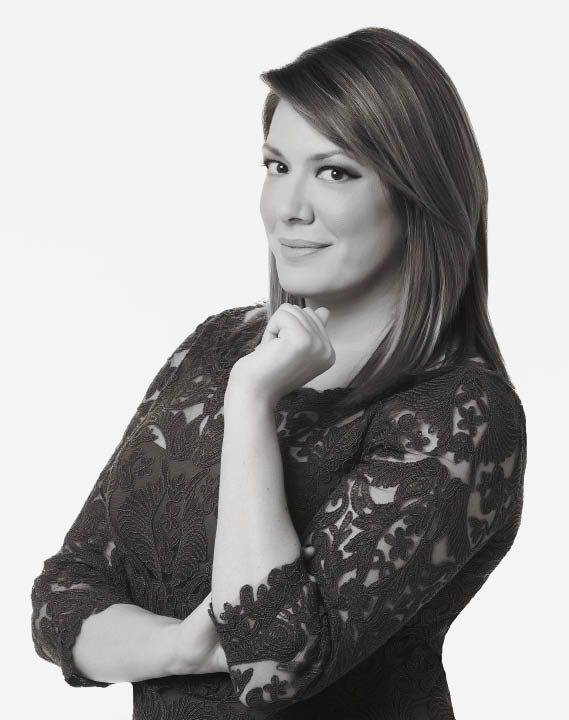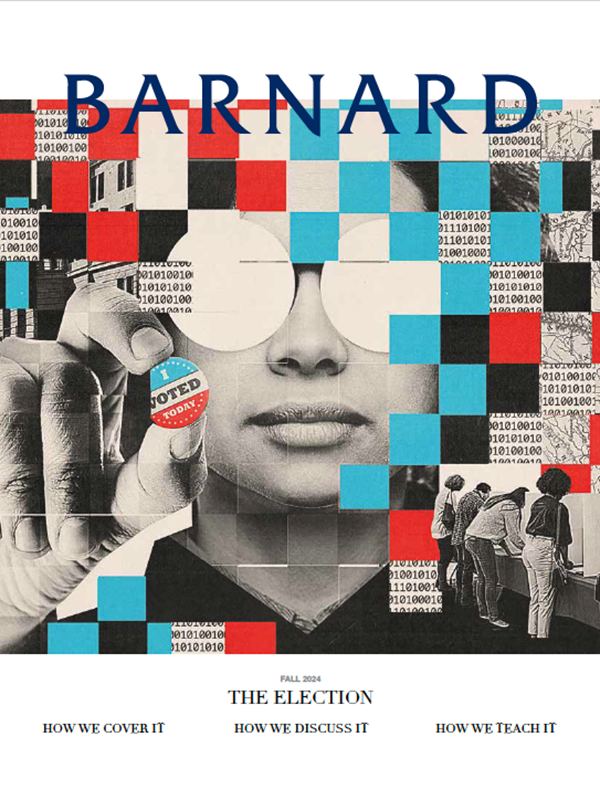A TV talk show where women sound off about everything from politics to reality television requires cohosts who can be decisive, irreverent, and opinionated. That’s why it’s called The View , a program created by Barbara Walters in 1997 to showcase women of different generations and their perspectives. As of July 2015, a Barnard alumna now has a seat at the table. Michelle Collins was named a cohost after frequent guest appearances.The award-winning writer, comedian, and pop-culture commentator talks with Barnard Magazine about bringing her humor, self-described giant personality, and clear convictions to daytime television.

It seems like a Barnard graduate would fit in well on The View . How do you call upon your Barnard skills in hot topics? Well, it depends on what you consider a “Barnard skill.” If we’re talking about loading a plate up with three pounds of sausages, eggs, etc.—a skill I honed during Barnard’s famous Midnight Breakfasts—then no, I have not called upon that skill just yet. But now that I’ve gotten my Midnight Breakfast mention out of the way, you definitely learn to navigate other people’s opinions in school, hearing people out, respecting them, and yes, sometimes getting into it with folks. At The View , much like at Barnard, we’re women with strong opinions who are never faulted for speaking our minds. It’s refreshing and, honestly, a serious privilege to be associated with both institutions.
What do you find most exhilarating and most frustrating about The View ? Live TV is an adrenaline rush, because you have to own everything that comes out of your mouth, which we do. But in this age of social media, from time to time single sentences or jokes that were part of a greater conversation can be taken out of context and torn apart, analyzed, and shot down the world over.
How do you feel you’re representing your alma mater on The View ? Being a strong, opinionated woman who stands up for her beliefs, and in my case doing comedy, is what being a Barnard gal is all about. The only difference is, most graduates don’t get the chance to do so sitting next to an EGOTer (Emmy, Grammy, Oscar and Tony winner Whoopi Goldberg). I used to get into spirited debates with my Barnard bestie, Annie Tucker ’02. Amazingly, despite this, we are still friends to this day.
How much of a culture shock was it coming to New York City from Miami, where you grew up? Major culture shock. Nowadays, Miami is the center of a booming art and music scene. But back in the 90s, not much was happening there for a 16-year-old gal. I think my “culture envy” is one of the reasons I ended up majoring in art history. I was excited that so much of what we were learning about was here where I could see all of it! One of the best things about Barnard was having the honor of taking classes at the Metropolitan Museum of Art on Mondays, when they used to be closed to the public. We’d see the florists installing the insanely dramatic flower arrangements in the lobby, and walk through the quiet halls, only to pass Tony Bennett getting a private tour. Plus, you know, the art.
Did you try stand-up comedy when you were in college? Not stand-up per se, but I was heavily involved in the comedy scene over at Columbia. Sophomore year, I got into Six Milks, one of two improv groups at Columbia. The importance of getting into Six Milks cannot be overstated—they are some of the most hilarious people I’ve ever met to this day, and the chemistry we had together really did shape who I am as a comedian—as did the Varsity Show, which I wrote for my senior year.
Does writing satisfy you in a different way than performing does? What’s funny is I do believe I have two different comedic voices, written and spoken. My written voice is usually more measured, logical, and composed. My performance voice is stream of consciousness, highly referential, more unpolished, and frenzied. My stand-up is mostly off the cuff and not written, which is I think why I enjoy the discipline of actually sitting quietly and letting my brain do the talking.
How did Barnard help prepare you for the often-unforgiving nature of the entertainment industry? It didn’t really. Getting bad notes from a professor on your thesis—it really wasn’t great—is a little different than reading hundreds of angry tweets from irate Americans and sometimes even from overseas. But I’ve been lucky in that the industry has been pretty kind to me so far. Case in point: I’ve lost exactly zero pounds since joining a network television show, and haven’t heard a word about it. That’s progress. •
